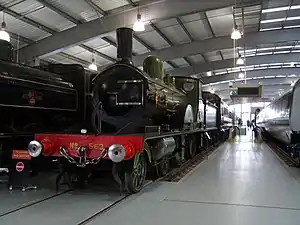| LSWR T3 class | |||||||||||||||||||||||||||||||||||||||
|---|---|---|---|---|---|---|---|---|---|---|---|---|---|---|---|---|---|---|---|---|---|---|---|---|---|---|---|---|---|---|---|---|---|---|---|---|---|---|---|
 T3 class 4-4-0 No. 563 on display at the Shildon Locomotion Museum. | |||||||||||||||||||||||||||||||||||||||
| |||||||||||||||||||||||||||||||||||||||
| |||||||||||||||||||||||||||||||||||||||
| |||||||||||||||||||||||||||||||||||||||
| |||||||||||||||||||||||||||||||||||||||
The LSWR T3 class is a class of express passenger 4-4-0 steam locomotives designed for the London and South Western Railway by William Adams. Twenty were constructed between 1892 and 1893. One, No. 563, has been preserved and restored to full working order.
The class were numbered 557–576, and had been intended as a variant of the X2 class with slightly smaller driving wheels (6 ft 7 in or 2.007 m versus 7 ft 1 in or 2.159 m). In reality, the coupled wheelbase was lengthened by 6 inches (150 mm) and the locomotive was fitted with a deep firebox 6 feet 10 inches (2.08 m) long – the largest firebox of any of Adams' designs - with a 19¾ square foot grate area.[1]
| Year | Order | Quantity | LSWR Numbers | Notes |
|---|---|---|---|---|
| 1892 | T3 | 10 | 557–566 | |
| 1893 | S5 | 10 | 567–576 | |
All passed to the Southern Railway at the grouping in 1923. Withdrawals started in 1930, and by the end of 1933 only three remained. No. 557 went in 1936, 571 in 1943, and the last, 563 was retired in August 1945 and set aside for preservation, at which point it had run 1.5 million miles.[2] From May to October 2011 it was in Toronto, Ontario, on loan for use in a theatrical production of The Railway Children at Roundhouse Park, a role it reprised from December 2014 to January 2017 when the production was staged at King's Cross, London.[3][4]
On 30 March 2017, No. 563 was transferred to the Swanage Railway Trust. The locomotive has now moved permanently to the Swanage Railway with a formal handover ceremony held at Corfe Castle on Saturday 27 May. Following an individual donation, the Swanage Railway declared their intention to explore the possibility of restoring the locomotive to working order, with a public appeal for additional funds being launched in October 2017.[5] The evaluation was positive and a full restoration programme was begun, with a target of returning to operation in 2023.[6] 563 returned to full public service on 8 October 2023 after a launch ceremony and supporters' special trains the previous day. [7][8][9][10]
| Year | Quantity in service at start of year | Quantity withdrawn | Locomotive numbers | Notes |
|---|---|---|---|---|
| 1930 | 20 | 1 | E561 | |
| 1931 | 19 | 8 | 558, 559, 562, 564, 566, 570, 572, 573 | |
| 1932 | 11 | 4 | 560, 568, 569, 575 | |
| 1933 | 7 | 4 | 565, 567, 574, 576 | |
| 1936 | 3 | 1 | 557 | |
| 1943 | 2 | 1 | 571 | |
| 1945 | 1 | 1 | 563 | 563 preserved |
References
- ↑ Russell (1991) p. 175
- ↑ "Swanage Railway: LSWR T3 No.563".
- ↑ Kennedy, Maev (16 January 2015). "Why loco is true star of Railway Children". The Guardian. p. 19. Retrieved 16 January 2015.
- ↑ "THE TRAIN & COACH". railwaychildrenlondon.com.
- ↑ "Swanage Railway raising money for restoration of T3 class No. 563". Bournemouth Echo. 26 October 2017. Retrieved 31 October 2017.
- ↑ "563 Locomotive Group". Swanage Railway.
- ↑ "563 returns to steam". Swanage Railway. Retrieved 8 October 2023.
- ↑ "LSWR T3 Class- 563- Supporters Launch Day 07/10/2023 (video)". Retrieved 8 October 2023.
- ↑ "Swanage Railway steam locomotive returns after 75 years". BBC. Retrieved 3 November 2023.
- ↑ "T3 class No. 563 returns to action on Swanage Railway after restoration". BBC. Retrieved 3 November 2023.
- Russell, J. H. (1991). A Pictorial Record of Southern Locomotives. OPC-Haynes. pp. 175–178.
External links
- LSWR T3 class SRemG
- LSWR T3 No.563 Swanage Railway
- Video of 563's return to steam day, 7 October 2023.